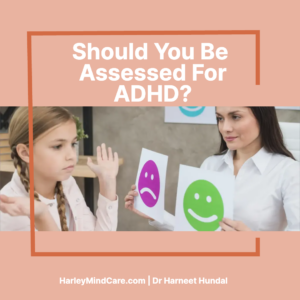Attention Deficit Hyperactivity Syndrome (ADHD) is a neurodevelopmental disorder that affects millions of people in the world. People with ADHD have inattentiveness, hyperactivity or impulsivity, and it is essential to seek assessment for this condition. However, it is a big decision, and it is not cheap to get an assessment for ADHD privately. Many people want to know beforehand whether they need an assessment instead of barking at the wrong tree.
There is not a single test to diagnose this mental condition, so you need to understand some typical features of this mental health condition. These features help you determine whether you have these symptoms or not. You should consult a mental health professional to get a diagnosis and treatment if you have symptoms.
Understanding ADHD
ADHD is a common condition and is characterised by continuous patterns of inattention, hyperactivity and impulsivity that interfere with daily functioning and development. Although it is often associated with children, ADHD can persist into Adulthood and significantly impact various aspects of life, including academic performance, work productivity, and relationships. According to robust research, about 4% of the population have ADHD in Adulthood, and less than 1% are diagnosed, which means it is massively underdiagnosed.
Why ADHD Is Underdiagnosed
The reasons why ADHD is underdiagnosed are too many. If you go to parts of America, almost 6 to 12% of people are diagnosed with this condition, but in the UK, it is less than 1%.
Part of the reasons could be that ADHD presents with symptoms that could be mistaken for other comorbid disorders. In addition, according to historical research conducted in the 1990s, it was believed that adults could not have ADHD. However, this believe was debunked because wrong scales were used in the historical research. If we use adult scales and standards for adults, it is found that 60 to 70 percent of people retain symptoms. However, the profile of symptoms in adults differs as there is much less hyperactivity and impulsivity, but inattentiveness remains. These inattentive symptoms are less easily noticed and hence, less likely to warrant further assessment. .
Signs And Symptoms Of ADHD
Recognising the signs and symptoms of ADHD is the first step towards seeking assessment and support. Inattention symptoms may include difficulty focusing on tasks, forgetfulness, and disorganisation. Hyperactivity symptoms are often described as restlessness, fidgeting, and excessive talking. Impulsivity symptoms may include acting without thinking, interrupting others, and difficulty waiting for one’s turn.
Who Should Consider ADHD Assessment?
If you notice following signs and symptoms persistently in you or your loved ones it is essential to seek ADHD assessment:
- You may notice as an adult that you think or feel different from your siblings; you approach things differently, such as finding it very difficult to sleep, being unable to settle with restlessness and fidgetiness, and having problems in school. Hyperactivity is the most accessible form to identify ADHD but many people do not present like that.
- If you do not see hyperactivity, you may have inattentiveness with difficulties in focusing, paying attention and task completion. You could also be a daydreamer. Inattentive symptoms can be masked by intelligence or stricter external structure or support from family. However, when the external structure slips away or there is less support from the environment or family, e.g. transitioning to secondary school or to university, the inattentiveness impacts on ability to focus on studies, exam preparation, task /assignment completion leading to feelings of stress and negative emotional impact.
- In adulthood, people may not have much hyperactivity, or it may remain as a bit of fidgeting or restless legs. Impulsivity is less in adults than children because they have learned social adaptations over time. However, inattentiveness persists into Adulthood. This can impact all areas of life from educational attainment, achievements; employment; completion of household chores; managing finances; task completion and emotional impact (mood lability, poor self esteem).
- Procrastination is another mainstay of ADHD. People with ADHD procrastinate and put things off till the last moment, not only the things they do not like but also routine, mundane, administrative chores. For example, their bills are unpaid, and tax returns are not sent in.
- People with ADHD in Adulthood are distracted by external stimuli and internal thoughts. They can not stick to a single thought, leading to sequential processing difficulties. Individuals with ADHD, may not complete a task in sequence e.g. ABCD; instead, they may do tasks in accordance to A, D, F, N, Z, B and go back again.
- Zoning out is another common feature of ADHD in Adulthood. It means when when they are talking to a person, often they are not listening and would be thinking about something else, and then need to ask questions repeatedly to clarify what the topic of conversation was.
- People with ADHD may end and begin a relationship impulsively. Or they may be in a relationship with their partner carrying more responsibility owing to their symptoms.
- Another feature of ADHD in adults is that they have a comorbid mood disorder or emotional dysregulation, which includes a sense of anxiety, frustration, and low-grade depression, often misdiagnosed as depression. Still, it is a consequence of chronic disorganisation or emotional impact of their symptoms on different areas of their life.
If you have any of these symptoms, you need to get an assessment for ADHD for proper support, guidance and treatment.
What Is ADHD Assessment?
Seeking assessment for ADHD involves a comprehensive evaluation by qualified professionals, such as psychiatrists. The assessment process may include interviews, questionnaires, observations, and neuropsychological testing. It aims to gather information about symptoms, medical history, and functioning across different settings.
Getting an assessment for ADHD is essential. It clearly explains your symptoms and challenges, leading to a tailored treatment plan. Assessment also facilitates self awareness and understanding of one’s symptoms. Assessment can facilitate access to support services, and educational interventions that can help individuals thrive despite their ADHD symptoms.
What Is The Importance Of Early Detection?
Early detection of ADHD is crucial for addressing symptoms and preventing long-term consequences. Untreated ADHD can lead to academic underachievement, impaired social relationships, and increased risk of substance abuse and mental health issues. By identifying and addressing ADHD early, individuals can receive the support they need to succeed academically, professionally, and personally.
What Are the Options Available For ADHD Assessment?
ADHD assessment can be conducted by various professionals, including medical doctors, psychologists, and psychiatrists. Each may have different approaches and expertise in diagnosing and treating ADHD. Some individuals may benefit from neuropsychological testing to assess cognitive functioning and identify specific strengths and weaknesses.
Things To Consider About ADHD Assessment
Here are a few things that you should keep in mind when thinking about taking an ADHD assessment:
Preparation For Assessment
Preparing for an ADHD assessment involves gathering relevant information about your symptoms, medical history, and developmental milestones. You should communicate openly with the assessing professional, discussing concerns and asking questions about the process. Proactively engaging in the assessment can ensure a comprehensive evaluation and accurate diagnosis.
Post Assessment Support
Once you receive an ADHD diagnosis, you can explore different treatment options, including medication, therapy and lifestyle changes. Understanding the diagnosis and its implications is essential for making informed decisions about treatment and support. Building a support network of healthcare providers, family members, and friends can also enhance coping strategies and overall well-being.
Self Advocacy And Empowerment
ADHD assessment marks the beginning of a journey towards self-awareness and empowerment. By actively participating in treatment decisions, seeking resources, and connecting with support groups, individuals with ADHD can advocate for their needs and embrace their strengths and challenges. It is essential to recognise that ADHD does not define a person but adds unique perspectives and talents to their life.
Personal Experiences and Testimonials
Stories of individuals who have undergone ADHD assessment and treatment can provide valuable insights and encouragement to others. Hearing about the challenges and achievements of navigating ADHD can help individuals feel less alone in their journey and more hopeful about their future. Personal testimonials highlight the importance of seeking assessment and pursuing support.
Addressing Common Concerns
Addressing common concerns about ADHD assessment can help alleviate fears and uncertainties. Many people worry about the stigma associated with ADHD or whether assessment will lead to unwanted consequences. It’s essential to reassure individuals that seeking assessment is a proactive step towards understanding and managing ADHD, with potential positive outcomes.
Conclusion
Considering an assessment for ADHD is a crucial step towards understanding and addressing this neurodevelopmental disorder. Despite its prevalence, ADHD often remains underdiagnosed, leading to unnecessary challenges in various aspects of life. Recognising the signs and symptoms of ADHD and seeking evaluation by qualified professionals can provide clarity and lead to tailored treatment plans and support services.
Early detection is essential to mitigate long-term consequences, and individuals are encouraged to proactively engage in the assessment process. Through self-advocacy, empowerment, and the support of a network of healthcare providers or friends, individuals with ADHD can navigate their journey with confidence and resilience. Remember, seeking assessment is a proactive step towards managing ADHD and improving overall well-being.
FAQs
ADHD assessment is for individuals of all ages who exhibit symptoms consistent with the condition. Both children and adults can benefit from seeking assessment and receiving appropriate interventions.
Medication is one of several treatment options for ADHD and may be recommended based on the individual’s symptoms and needs. However, treatment decisions are made collaboratively between the individual and their healthcare provider and may involve a trial period or exploration of non-medication interventions.
Yes, ADHD can be managed through various strategies, including therapy, behavioural interventions, lifestyle modifications, and support services. Medication is not always necessary or suitable for everyone with ADHD, and treatment plans should be tailored to individual preferences and circumstances.
The duration of the ADHD assessment process can vary depending on factors such as the complexity of symptoms, availability of professionals, and the need for additional testing. Typically, the process involves taking a detailed history, assessment of symptoms to gather comprehensive information and make an accurate diagnosis.
ADHD assessment and diagnosis are confidential medical matters and should not directly impact job prospects or academic opportunities. However, seeking assessment and treatment can help individuals better understand their strengths and challenges, allowing them to make informed decisions about their education and career paths.

I’m Dr. Harneet Hundal, a Senior Consultant Psychiatrist with 20 years of experience. Specialising in forensic and community psychiatry, I’ve led initiatives to improve mental health services and address inequalities. My expertise spans mood, anxiety, psychotic, and personality disorders, as well as neurodevelopmental conditions.


